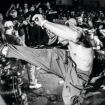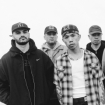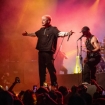Speed were never meant to escape Australia. It's rare for bands from their isolated continent to break out globally — and rarer still for an outfit that specializes in take-no-prisoners, beatdown hardcore.
Yet against all odds, in 2022 the Sydney crew found themselves 7,500 miles away from home, onstage at Los Angeles' Sound and Fury Fest, playing in front of five thousand furiously moshing fans. Frontman Jem Siow says people often ask if this was a dream come true — and he tells them that it's not, because he never could have dreamed it in the first place.
"It felt like I was on a movie set, but I was also part of the movie," the 30-year-old says with a grin, recalling the moment on a video call from Tokyo where Speed are getting ready for a Japanese tour.
He first knew that something life-altering was happening at the band's Sound and Fury debut (they were invited to return in 2023) when he caught the kick-off show the night before the festival. He was excited to see the headliners, Candy, but he missed most of their set — because showgoers kept tapping him on the shoulder and telling him how stoked they were to see Speed.
"Every few meters I was stopped by hardcore kids excited to meet me," he says. "I was saying, 'I guarantee you, bro, I'm 100 times more excited than you! I'm the same as you; I'm just a hardcore kid!'"
The next day, Siow's partner filmed and livestreamed Speed's set, and all their friends and family back in Australia were watching. "There's only ever been an amount of bands I can count on one hand from Australia that have played [Sound and Fury]," says Siow. "It felt like we'd gone to the Olympics, and we won gold."
At the time, the band — Siow, his brother and bassist Aaron Siow, guitarists Josh Clayton and Dennis Vichidvongsa and drummer Kane Vardon — were fresh off the release of their 2022 EP, Gang Called Speed.
The snarling, confrontational, mosh-ready tunes on there connected with an audience far beyond the borders of their home island: Around the world, hardcore kids were ready to join Speed's gang. They've since played blazing sets across the U.S., U.K. and Southeast Asia — earning them even more fans and notable supporters: from Post Malone and Travis Barker to Trapped Under Ice and Drain — and they're now starting work on their debut full-length.
While his scowling face on the EP artwork, antagonistic lyrics and Speed's tough-guy music videos might suggest otherwise, Siow — who in conversation wears a perpetual smile — might just be the friendliest guy in hardcore. His passion for the genre, even in a genre driven almost purely by passion, is strikingly palpable. Speed are having their moment, and Siow is happily ready to seize it.
Siow got his introduction to heavy music as a preteen in the early 2000s. "I fell in love with Linkin Park," he says. "Then, obviously, Parkway Drive was the most impactful heavy band of our generation [in Australia]."
He saw the latter group for the first time in 2006 at Sydney's Forum. It was mind-blowing for the then-13-year-old Siow to witness the moshing and crowd participation and realize that the audience was just as much a part of the show as the musicians onstage.
After that, he began attending DIY hardcore shows at a local youth center and started his own group with his friends from school. From that point on, he's always been in bands.
He credits this lifelong passion to the support of his parents, who emigrated to Australia from Malaysia. "My parents really gave me permission to find what I loved and embrace that," he says. He recalls one heart-to-heart with his dad around the time of his final high school exams:
"He said, 'Any other Asian parent would be telling you right now that you should go do your maths homework. But I'm gonna tell you, you should go and write some riffs.'"
Immediately after that conversation, Siow called his friend Joel Martonara and together they started the melodic post-hardcore band Endless Heights. That outfit achieved some notable successes, including an opening spot for the Amity Affliction's U.K. and EU arena tour, but Siow felt a pull to create something heavier.
Endless Heights called it quits in 2019 — the same year Speed launched with a clear but ambitious goal: to transform Sydney's faltering hardcore scene into a thriving one.
"The one undying mission of Speed is to promote Australian hardcore culture," he says. "And I see that as a product of my friendship group — because everybody that I love in my life, bar the people that share blood with me, I know in some way through hardcore.
"We're quite an isolated scene, and we've rarely had the limelight on the global stage. So with that comes [the mindset of,] if we don't get the support from elsewhere, we'll just support ourselves."
After releasing a demo in 2019 and a two-track EP in 2020, Speed dropped their most developed work yet with the six-song Gang Called Speed. Lyrically, it sees Siow channel the moments where he can no longer be the nice guy. It's pure fury — an attitude epitomized on the raging "Not That Nice" on which he declares: "When you act a fool you've gotta face a fight."
He wrote these songs during the early months of the pandemic, when there was a global surge in hate crimes against the East and Southeast Asian diaspora, and the songs are explicitly targeted to-wards racists and bigots.
"I don't wanna have any enemies in my life. I try to see the good in everybody. But at the same time, there's some instances where I have to draw a line in the sand," Siow says. "I would see videos of an elderly Asian person overseas getting attacked. If anyone did that to my gung gung or my yeh yeh [Cantonese terms for grandfather], you wouldn't see the next day."
He continues, "We're in this position where we feel confident to be vocal and we feel empowered to be onstage. But there's so many other Asian kids who don't have that, who weren't brought up that way. So a big part of this is just trying to give permission to people to speak up for themselves, and pursue their own vision of their own identity."
It's this determination that has captured the worldwide hardcore scene's attention and made possible that unreal moment onstage at Sound and Fury. The past couple years of Speed's ascent have been "life-changing," Siow says.
"I was 29 last year [when Speed blew up], it's not like I was a kid. I was content with everything I had; I didn't need anything more. And now this is happening; it's a gift. But I don't really think there's anything special in what we're doing at all. Someone said, 'Yes, go ahead and do it,' so I'm doing this. If someone had said that to so many other kids who have so much potential, there would be so many other people who are doing what we're doing."
As for Speed's core mission to fly the flag for Australian hardcore and breathe fresh life into the scene, they're definitely succeeding. Siow says there are now hundreds of faces showing up to local Sydney hardcore shows week after week; and if you like Speed, he says, you need to check out the rosters of Last Ride Records and Life.Lair.Regret Records.
"We're already old," says Siow. "Hardcore is a youth movement. We need to pass the torch. We can't be the only Speed from Australia — there needs to be more."












